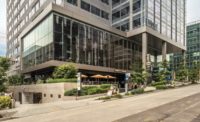Developer Selects Fireproofing & Slab Systems for LEED-Certified Project
-(1).jpg?1707507247)
In May of 2023, IDI Logistics, a leading developer and manager of logistics real estate in the U.S. and Peak Construction Corporation, a full-service design-build general contractor, broke ground on a new warehouse facility in Joliet, Ill. The 677,000 square foot building project was laser-focused on reducing their carbon footprint and achieving specific sustainability goals.
IDI Logistics is a pioneer in environmentally sustainable and affordable “eco-warehouse” development. As a member of the U.S. Green Building Council, the developer participates in the LEED® (Leadership in Energy and Environmental Design) program. In 2023, IDI was recognized as Gold Level Green Lease Leader by the Institute for Market Transformation (IMT) and the U.S. Department of Energy’s (DOE) Better Buildings Alliance.
Leading the way on environmental, social and governance (ESG) buildings across North America, averaging the development of 5 million square feet of buildings per year, IDI sought key partners to uplevel the Illinois warehouse to be a LEED-certified building. Together with Peak Construction, they teamed up with design and engineering teams at Ware Malcomb & Jacob & Hefner Associates, Inc. to bring the project to the finish line of being LEED-certified. In addition, their approach was to look at sustainability beyond LEED by seeking to reduce their carbon footprint.
Challenges:
IDI secured Ecolab as the tenant of the warehouse, a global sustainability leader offering water, hygiene, and infection prevention solutions and services that protect people and the resources vital to life. With the new tenant, the design team had to promptly transition from building a standard warehouse to a lab-like facility.
Two primary needs were to upgrade the fireproofing for the storage of Ecolab’s flammable items, and warehouse flooring to accommodate their double rack (shelving) systems. These critical requirements needed to be installed in a tight-time frame, all while meeting LEED specifications.
Solutions:
Fireproofing that contributes to LEED
IDI Logistics selected GCP’s MONOKOTE® Fireproofing to provide the fire protection needed for Ecolab’s materials, as it is both high-performing and met the LEED requirements.
All MONOKOTE® Fireproofing materials have Type III environmental product declarations (EPD). According to a report developed by the UN Environment Program, the construction industry is by far the largest emitter of greenhouse gasses, accounting for 37% of global emissions. This urgent need has led architects, building owners and specifiers to recognize the need of EPDS as a tool to bring down the embodied carbon of their buildings.
“We like MONOKOTE as a fireproofing solution due to its EPDs," said IDI Logistics Chicago Vice President of Development Steve Golumbeck. “For us it was a win-win. MONOKOTE® was the most economical, met all fireproofing criteria, and it had a better carbon footprint.”
MONOKOTE® Fireproofing products also meet the needs of projects targeting LEED V4 or Living Building Challenge certification, and with a carbon footprint that is less than half that of the industry average for similar products. All information related to the sustainability of MONOKOTE® Fireproofing products has been investigated and verified by third parties.
“When IDI was evaluating fireproofing solutions, we didn't know if we were the least expensive option for the project,” said GCP Fire Protection Technical Services Manager John Dalton, P.E. “Competitive bids are always pretty close, but we credit Steve and IDI for understanding the value of the embodied carbon savings in MONOKOTE®. Instead of sustainability being an exercise in checking boxes, to their credit this developer went a step further and made embodied carbon a conscious choice. It’s critical that we look beyond simply compiling documentation, and start using EPDs as a tool to allow us to reduce our carbon footprint in the building industry.”
Engineered slabs reduce environmental impact & increase flexibility
IDI Logistics selected their trusted warehouse flooring solution, DUCTILCRETE® engineered slab systems from CHRYSO & GCP, to reduce the global warming potential (GWP), seamlessly provide the concrete floor surface needed for Ecolab’s racking system – and save money in the process.
“DUCTILCRETE is our preferred slab system for all of our buildings across the nation,” stated Golumbeck. “We like to construct a building from both a maintenance and energy efficient perspective. DUCTILCRETE helps us meet both of those objectives with its reduced controlled joint slab, and it is the most cost effective in long-term maintenance.”
Traditionally, warehouse facilities are built with concrete slabs, a process involving materials which results in high amounts of CO2 emitted into the atmosphere. Since DUCTILCRETE® engineered slab systems are typically thinner than traditional concrete slabs, they require considerably less cement. For example, using a DUCTILCRETE® system for a 1,000,000 square foot warehouse could eliminate roughly 1.2M lb. of CO2 emissions.
The DUCTILCRETE® engineered systems not only drives down CO2 use, but their unique design significantly lowers maintenance costs. Traditional concrete slabs are prone to cracking due to control joints and concrete curling. By drastically reducing the number of control joints and utilizing a system that reduces the potential for curling, DUCTILCRETE® engineered slabs remain flat providing tenants with greater flexibility in racking and equipment layouts, and are easier to maintain. These very flat slabs are also ideal for those using a computerized picking system or cantilevered racking systems.
“If we used a conventional slab we would have to upgrade the slab, and Ecolab would have been isolated to use their racking only in certain areas of the warehouse," commented Golumbeck. “With DUCTILCRETE we were able to give them the capability to move the racking anywhere in the warehouse as the slabs are 6 inches throughout.”
Installed by licensed DUCTILCRETE installer Scurto Cement Construction, the use of DUCTILCRETE engineered slabs also significantly reduced the time needed. Instead of a typical 30 weeks to install slabs, the DUCTILCRETE engineered slabs were installed in just five weeks.
Conclusion:
The IDI Logistics & Peak Construction warehouse project in Illinois is expected to be completed by mid Q2 2024. The use of MONOKOTE® Fireproofing and DUCTILCRETE® engineered slabs system checked all the boxes:
- Reduced carbon footprint and GWP
- Expedited project timeline
- Reduced long-term operating costs
- Proven high-performance solutions
- Met or exceeded LEED standards
In addition, the solutions assisted the team with their objective of going beyond required LEED documentation, and reducing the overall carbon footprint.
MONOKOTE® Fireproofing and DUCTILCRETE® Engineered Slab Systems are proudly part of the Saint-Gobain family, providing a comprehensive portfolio of solutions for high-performance and sustainable construction.
Looking for a reprint of this article?
From high-res PDFs to custom plaques, order your copy today!






